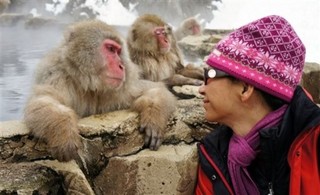Following the earthquake and tsunami on March 11, 2011, and the subsequent nuclear crisis in Fukushima Prefecture, Japan's manufacturing sector suffered greatly due to the damage caused to the nation's supply chains.
Attention should be paid to other sectors that are still reeling from the 3/11 disasters such as tourism and agricultural exports. The government should take rational measures to bolster these sectors.
According to an estimate by the Japan National Tourism Organization, 6,219,000 tourists visited Japan in 2011 — a 27.8 percent plunge from the previous year. The biggest number of tourists came from South Korea (1,658,000, down 32 percent), followed by China (1,044,000, down 26.1 percent), Taiwan (994,000, down 21.6 percent), the United States (566,600, down 22.2 percent) and Hong Kong (365,000, down 28.3 percent).
Another JNTO study shows that the number of tourists from China in January 2012 increased 39.6 percent from a year before to 138,400. The number of tourists from Taiwan rose 29.6 percent to 125,900 the same month. But those coming from South Korea fell 35.4 percent, standing at 173,400.
It appears South Korean media reports in early April 2011, which warned of the dangers of radioactive rain, impacted the perception of South Koreans over the situation in Japan after the disasters. South Koreans even closed elementary schools out of fear over contaminated rain. And in the fall of 2011, a rumor spread in Hong Kong that visiting Japan would deprive a woman of her ability to bear children.
Merely promoting tourism in Japan will not automatically increase the number of foreign tourists. The government must strictly monitor radiation levels at tourist spots and disseminate accurate and timely information.
Japan's exports of agriculture, forestry and fishery products fell 8.3 percent in 2011 from the previous year to ¥451.3 billion. Such exports to Hong Kong, the biggest importer, dropped 8.1 percent to ¥111.1 billion (South Korea, ¥40.6 billion, down 12 percent; China, ¥35.9 billion, down 35.4 percent; and the European Union, ¥29.6 billion, down 15.1 percent).
In mid-February, 47 countries and regions had placed restriction on imports from Japan's agricultural, forestry and fishery sectors. Japan should proactively enlighten other countries concerning products whose safety has been confirmed.
| Share var addthis_config = {"data_track_clickback":true};We welcome your opinions. Click to send a message to the editor.
The Japan Times (C) All rights reservedgoogletag.display('div-gpt-ad-1322656020522-4'); googletag.display('div-gpt-ad-1322656020522-9'); googletag.display('div-gpt-ad-1322656020522-10'); googletag.display('div-gpt-ad-1322656020522-5'); googletag.display('div-gpt-ad-1322656020522-6'); googletag.display('div-gpt-ad-1322656020522-7'); Ready to expand your horizons and study in Japan?
Here's your resource for locating the educational institutions and curriculum best suited to you and your goals.
new TWTR.Widget({ version: 2, type: 'profile', rpp: 4, interval: 4000, width: 'auto', height: 200, theme: { shell: { background: '#c2dbf2', color: '#050105' }, tweets: { background: '#ffffff', color: '#000000', links: '#0d45de' } }, features: { scrollbar: false, loop: true, live: false, hashtags: true, timestamp: true, avatars: false, behavior: 'default' } }).render().setUser('japantimes').start();About us | Work for us | Contact us | Privacy policy | Link policy | Registration FAQ Advertise in japantimes.co.jp. This site has been optimized for modern browsers. Please make sure that Javascript is enabled in your browser's preferences. The Japan Times Ltd. All rights reserved.
Attention should be paid to other sectors that are still reeling from the 3/11 disasters such as tourism and agricultural exports. The government should take rational measures to bolster these sectors.
According to an estimate by the Japan National Tourism Organization, 6,219,000 tourists visited Japan in 2011 — a 27.8 percent plunge from the previous year. The biggest number of tourists came from South Korea (1,658,000, down 32 percent), followed by China (1,044,000, down 26.1 percent), Taiwan (994,000, down 21.6 percent), the United States (566,600, down 22.2 percent) and Hong Kong (365,000, down 28.3 percent).
Another JNTO study shows that the number of tourists from China in January 2012 increased 39.6 percent from a year before to 138,400. The number of tourists from Taiwan rose 29.6 percent to 125,900 the same month. But those coming from South Korea fell 35.4 percent, standing at 173,400.
It appears South Korean media reports in early April 2011, which warned of the dangers of radioactive rain, impacted the perception of South Koreans over the situation in Japan after the disasters. South Koreans even closed elementary schools out of fear over contaminated rain. And in the fall of 2011, a rumor spread in Hong Kong that visiting Japan would deprive a woman of her ability to bear children.
Merely promoting tourism in Japan will not automatically increase the number of foreign tourists. The government must strictly monitor radiation levels at tourist spots and disseminate accurate and timely information.
Japan's exports of agriculture, forestry and fishery products fell 8.3 percent in 2011 from the previous year to ¥451.3 billion. Such exports to Hong Kong, the biggest importer, dropped 8.1 percent to ¥111.1 billion (South Korea, ¥40.6 billion, down 12 percent; China, ¥35.9 billion, down 35.4 percent; and the European Union, ¥29.6 billion, down 15.1 percent).
In mid-February, 47 countries and regions had placed restriction on imports from Japan's agricultural, forestry and fishery sectors. Japan should proactively enlighten other countries concerning products whose safety has been confirmed.
We welcome your opinions. Click to send a message to the editor.
Here's your resource for locating the educational institutions and curriculum best suited to you and your goals.
About us | Work for us | Contact us | Privacy policy | Link policy | Registration FAQ Advertise in japantimes.co.jp. This site has been optimized for modern browsers. Please make sure that Javascript is enabled in your browser's preferences. The Japan Times Ltd. All rights reserved.
Read Full Article »



